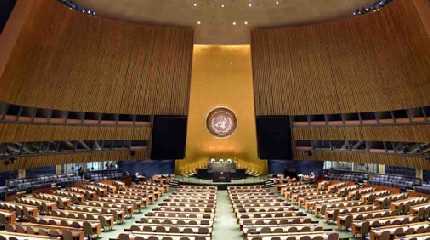
KUALA LUMPUR, Dec 26 (NNN-Bernama) — The United Nations General Assembly (UNGA) should vote to suspend Israel for its ongoing war on Gaza and the decades long Apartheid policies against the Palestinian people, an analyst said.
Director of Hashim Sani Centre for Palestine Studies at Universiti Malaya Assoc. Prof Dr Mohd Nazari Ismail said the UNGA had taken a similar decision to suspend the South African Apartheid regime in Nov 1974.
The decision effectively barred South Africa from any sessions in the UN including taking its seats, speak, make proposals or vote until it was lifted in 1994.
Although such move is of lesser impact, Mohd Nazari believed it could be the first crucial step to push the Zionist regime into isolation.
The call came amid failures of the UN Security Council (UNSC) to demand a ceasefire as death toll and destruction continue to soar in the Occupied Palestinian Territories of Gaza and West Bank.
In the latest development, the UNSC passed a resolution on Dec 22 to increase delivery of urgent humanitarian aid to Gaza after four postponements since Dec 18 due to US disagreement in the language used on the UAE-led draft.
The resolution, supported by 13 of its members while the US and Russia abstained, however did not call for the much needed ceasefire.
The resolution is weak as it did not demand Israel to stop attacking Gaza, and the injustice towards Palestinians will continue in the form of apartheid policies and practices of the Israeli regime, he said.
Mohd Nazari said other countries could also take unilateral actions including boycotts and sanctions to pressure Israel to observe international law.
One of the best examples, he said, was a decision taken by the Malaysian government on Dec 20 to ban Israeli-owned ships from docking in Malaysia.
“Other countries should end all diplomatic and trade relations with Israel. If all countries threaten to withdraw from the UN if the US keep vetoing the UNSC vote against Israel, that will be great, too,” he said.
Rising Conscience
The latest Israel-Palestine conflict which started on Oct 7 has given rise to awareness among civil societies on the Palestine question and the brutal oppressions the Palestinians faced in the hands of the Zionist regime for over seven decades.
Thousands of people held peaceful demonstrations across the world and boycotted businesses linked to the regime in protest of its atrocities.
Mohd Nazari who is also Boycott, Divestment and Sanctions (BDS) Malaysia movement chairman opined that the international community should boycott Israel as long as it continues to violate international law and refuse to grant Palestinians their fundamental rights to freedom, justice and equality.
Sharing the same view, Director of Asia Middle East Centre for Research and Dialogue (Amec) Muslim Imran said it is impossible to achieve a lasting peace, and a free and independent Palestine State if the regime continued to maintain an apartheid system on the Palestinian people.
“Dismantling of the apartheid policies is the first step toward ending this ongoing plight and suffering of the Palestinian people.
“And it is impossible to negotiate without a ceasefire,” he said.
On talks of another Israel-Hamas prisoners swap deal, Muslim said it would not be possible without any ceasefire.
“For Hamas it’s very clear from day one that they are interested in exchanging prisoners but would not negotiate under fire.
“So Israel must end its ongoing operation in order for the two sides to sit down and negotiate the next round of prisoners swap deal,” he said.
Israel and Hamas held a seven-day cease fire in November to exchange prisoners in a deal mediated by Qatar.
According to reports, Hamas released 86 women and children, in addition to 24 foreign nationals in exchange for 240 Palestinians women and teenagers held in Israeli prisons during the humanitarian pause.
Bloodiest Year
The year 2023 will end as the deadliest year in the history of Palestine-Israel conflict.
More than 20,000 people – 70 per cent of them women and children have been killed and more than 54,000 were injured while at least 7,000 more reportedly missing or buried under rubble in Israeli relentless attacks on Gaza Strip that began more than two months ago.
Around 85 per cent of the population or 1.9 million people in the Gaza Strip were reportedly displaced by the war.
There has also been widespread destruction of homes and other critical infrastructure including hospitals, besides serious shortage of food, fuel, water and medicines in the besieged enclave.




